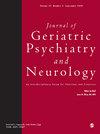Findings from the Promoting Independence in Dementia App (PRIDE-app) Study a Reach, Effectiveness, Adoption, Implementation, and Maintenance Framework Discussion
IF 2.9
4区 医学
Q2 CLINICAL NEUROLOGY
引用次数: 0
Abstract
IntroductionSelf-management is pivotal in helping people with their independence and in managing their health conditions more effectively. The PRIDE-app is a novel online intervention, providing support and information for people living with dementia and their families, aimed at increasing self-management and improving quality of life. Knowledge generated will help inform future developments to the app, with the aim of improving its uptake and implementation in services.MethodsA mixed-methods approach incorporating the RE-AIM framework. Recruited 25 people living with dementia, of which 17completed the PRIDE-app intervention over 8 weeks with support from a dementia adviser facilitator. Measures exploring mood, physical well-being, and quality of life were collected at baseline, 3 and 6 months and analysed through modelled analysis. Post-intervention interviews were conducted with participants and facilitators and analysed through thematic analysis.ResultsQuantitative results did not show significant improvements in participants’ scores. Qualitative data showed that the PRIDE-app motivated people to reconnect socially and set individual goals for activities. Participants and facilitators identified areas for improvements to the app interface and delivery format.ConclusionsThis study evaluated the PRIDE-app’s reach, effectiveness and adoptability in the independence and quality of life of people living with dementia, as well as how it could be implemented and maintained within services. Pre- and post-intervention scores were inconclusive. Interviews provided positive feedback of the app’s influence on peoples’ activities and mood.促进痴呆症患者独立生活应用程序(PRIDE-app)研究的结果:覆盖范围、有效性、采用、实施和维护框架讨论
导言:自我管理在帮助人们独立生活和更有效地控制健康状况方面起着关键作用。PRIDE应用程序是一种新颖的在线干预措施,为痴呆症患者及其家人提供支持和信息,旨在加强自我管理和提高生活质量。所获得的知识将有助于为该应用程序的未来发展提供信息,从而提高该应用程序的使用率和服务实施率。招募了 25 名痴呆症患者,其中 17 人在痴呆症顾问的协助下完成了为期 8 周的 PRIDE-app 干预。在基线、3 个月和 6 个月期间收集了有关情绪、身体健康和生活质量的测量数据,并通过模型分析进行了分析。干预后对参与者和促进者进行了访谈,并通过主题分析进行了分析。结果定量结果显示,参与者的得分没有显著提高。定性数据显示,PRIDE-app 激励人们重新建立社会联系,并为活动设定个人目标。结论这项研究评估了 PRIDE 应用程序在提高痴呆症患者的独立性和生活质量方面的影响力、有效性和可采用性,以及如何在服务中实施和维护该应用程序。干预前和干预后的得分并无定论。访谈对该应用程序对患者活动和情绪的影响给予了积极反馈。
本文章由计算机程序翻译,如有差异,请以英文原文为准。
求助全文
约1分钟内获得全文
求助全文
来源期刊
CiteScore
6.20
自引率
0.00%
发文量
40
审稿时长
>12 weeks
期刊介绍:
Journal of Geriatric Psychiatry and Neurology (JGP) brings together original research, clinical reviews, and timely case reports on neuropsychiatric care of aging patients, including age-related biologic, neurologic, and psychiatric illnesses; psychosocial problems; forensic issues; and family care. The journal offers the latest peer-reviewed information on cognitive, mood, anxiety, addictive, and sleep disorders in older patients, as well as tested diagnostic tools and therapies.

 求助内容:
求助内容: 应助结果提醒方式:
应助结果提醒方式:


